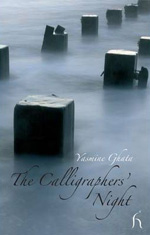
In language at times reminiscent of the intricacy of calligraphic script, The Calligrapher's Night tells the story of Rikkat Kunt, the author's grandmother. Beginning with her death in 1986 and going back to the years of her youth, Rikkat narrates her life through much of Turkey's eventful 20th century history.
Following what she feels is her true vocation, and trying to evade the drudgery of a failing marriage, Rikkat becomes a calligrapher, thus challenging tradition by choosing a profession reserved to men. When in 1928 Atatürk, founder of the Republic of Turkey in 1923 and Turkey's first president, breaks with tradition and changes the characters of the Turkish alphabet from Arabic to Latin, the ancient and elegant art of calligraphy loses much of its predominance, and is relegated mainly to academic circles and university teaching.
While following Rikkat's work and progress as a calligrapher and eventually as a teacher, we learn that she has had two failed marriages in her life, and two sons. Her love for calligraphy becomes an obsession and a refuge from the toil and disappointments of marriage.
The narration of The Calligrapher's Night has almost a fairytale quality. Rikkat's devotion to her trade is captured in lovely and sensuous prose:
The tools of the calligrapher's trade, qalams, makta, and divit (a pen made of reed, a small plate on which the tip of a qalam is sharpened, and a portable writing case) are so vividly described that they become almost tangible.
Since I do not know French, I could not read the book in the original version, as I would have liked to do; however, I
was immediately captivated and charmed by the translator's skill and his splendid use of language. Published in 2004,
The Calligrapher's Night has already won several prizes in France. It is Yasmine Ghata's first work of
fiction and, hopefully, will not be her last.

Hesperus Press, paperback, 978-1843914303
